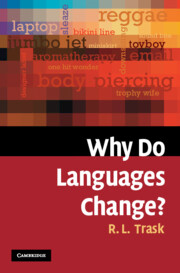Book contents
- Frontmatter
- Contents
- List of figures and tables
- A few words before we start
- Acknowledgements
- 1 How do languages change?
- 2 Why are languages always changing?
- 3 Where do words come from?
- 4 Skunk-Leek – my kind of town: what's in a name?
- 5 Where does English come from?
- 6 Why is American English different from British English?
- 7 Why is English spelling so eccentric?
- 8 Which is the oldest language?
- Some final thoughts
- Further reading
- Index
- Frontmatter
- Contents
- List of figures and tables
- A few words before we start
- Acknowledgements
- 1 How do languages change?
- 2 Why are languages always changing?
- 3 Where do words come from?
- 4 Skunk-Leek – my kind of town: what's in a name?
- 5 Where does English come from?
- 6 Why is American English different from British English?
- 7 Why is English spelling so eccentric?
- 8 Which is the oldest language?
- Some final thoughts
- Further reading
- Index
Summary
Language change is inevitable
There is nothing anyone can do to avoid it: the only unchanging language is a language without native speakers, such as Classical Latin or Sanskrit. Languages of this type may be of considerable importance within certain cultures, but they are retained as a heritage item, rather than an integral part of everyone's experience from early childhood. Moreover, there was a time when languages of this type were true languages: at that time, these languages were as given to change as any other natural language: we need only consider the differences between early varieties of Latin and the Classical Latin many of us learned at school to recognise this truth.
Language change is everywhere
As I hope I have shown in this book, everywhere we look we will find evidence of language change. We can hear it in our own linguistic behaviour and in that of people younger and older than us. We can see it in the names of places, whether we understand them or not. We can perceive it in the books we read and the reasons why we choose not to read books or plays which were once fashionable and current. All we need to do to begin to do this is to ‘tune’ our inner ear to recognise change; with further study, it becomes very difficult not to concentrate on change in the past and the present.
- Type
- Chapter
- Information
- Why Do Languages Change? , pp. 185 - 186Publisher: Cambridge University PressPrint publication year: 2009



